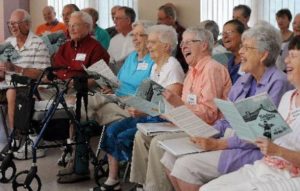
We all know to eat right, exercise, and get a good night’s sleep to stay healthy. But can flexing our creative muscles help us thrive as we age? Ongoing research looking at singing group programs, theater training, and visual arts for older adults suggest that participating in the arts may improve the health, well-being, and independence of older adults.
“Researchers are highly interested in examining if and how participating in arts activities may be linked to improving cognitive function and memory and improving self-esteem and well-being. Scientists are also interested in studying how music can be used to reduce behavioral symptoms of dementia, such as stress, aggression, agitation, and apathy, as well as promoting social interaction, which has multiple psychosocial benefits,” said Lisa Onken, Ph.D., of NIA’s Division of Behavioral and Social Research.
Dr. Johnson tested this approach, leading Community of Voices, the largest randomized clinical trial to test the impact of participating in a community choir on the health and well-being of nearly 400 culturally diverse adults, age 60 and older, from 12 senior centers in San Francisco. The centers were randomly chosen to conduct the choir program immediately (six intervention groups) or 6 months later (six control groups). Outcome measures were collected at baseline (prior to starting the intervention), 6 months (end of randomization phase), and 12 months (1 year after enrollment). Each choir met once a week in 90-minute sessions for 44 weeks and performed in several informal concerts.
At weekly rehearsals, professional choral directors from the San Francisco Community Music Center trained in the intervention led activities to promote health and well-being. Researchers assessed participants’ cognition, physical function, and psychosocial function, as well as their use and cost of healthcare services, before they started the choir program and again after 6 and 12 months.
A unique aspect of the study was its use of community partners to engage, enroll, and retain a large group of racially and ethnically diverse and low-income older adults. Participants were recruited and completed all choir activities and assessments at the senior centers, which made it more convenient for them to join and continue in the study.
Participating in the community choir showed positive results within 6 months. In particular, it reduced feelings of loneliness and increased interest in life. However, cognitive and physical outcomes and healthcare costs did not change significantly. Dr. Johnson attributed the improvements to the choir providing a meaningful, regular opportunity to meet new people, build social support, and increase a sense of belonging.
“The study showed increased interest in life because singing in the choir provided a regular, structured activity for participants,” she said. “Access to regular activities in diverse, low-income communities is vital for older adults to remain active and engaged in their community.”
Dr. Onken noted, “By examining the mechanisms through which arts participation may provide benefits to health and well-being, and by studying arts participation with scientific rigor, we hope to establish a firm basis on which to develop programs to improve the health and well-being of older people. As these studies continue, we expect the results to show us how we can implement cost-effective, community-based programs that benefit older people.”
